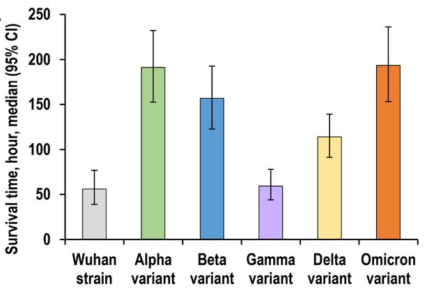Digital stool samples, love-hormone problems, running for your eyes, and more
04 Feb 2022
Posted by Andrew Kantor
Tim Short announces state-office candidacy
GPhA Past President Tim Short has announced that he’s running for state representative for Georgia’s newly drawn district 28.
“I am running to represent and preserve the conservative values of our district,” announced Short. “With the decline in leadership and the lack of integrity in our political system over the last few years, I am motivated to provide an honest, straightforward and trustworthy voice in our state capitol.”
Sign up to support Tim and get more info at votetimshort.com.
Our number two story
Ulcerative colitis is one of those conditions likely caused by gut bacteria. The question, though, was “How?” That’s in the past tense because UC San Diego researchers think they’ve figured it out using what they call, I kid you not, ‘digital stool.’
They take patient samples and analyze them in incredible detail, “allow[ing] the team to examine its biology at multiple scales and develop new hypotheses of disease progression.”
In this case, they identified the cause of that ulcerative colitis:
The team found that roughly 40 percent of ulcerative colitis patients show an overabundance of proteases — enzymes that break down other proteins — originating from the gut resident Bacteroides vulgatus. […] the colitis could be significantly reduced by treating the mice with protease inhibitors.
That, they think, is just the start. As David J. Gonzalez, associate professor of pharmacology put it, “Digitizing fecal material is the future.”
I won’t tell your patients if you won’t
Know someone with dry, itchy eyes? Apparently, Canadian researchers have found that you don’t need drops — aerobic exercise can treat it by causing “a significant increase in tear secretion and tear film stability.” And having unstable tear films is something no one wants.
Variant survival note
Newer Covid-19 variants survive longer on skin and plastic surfaces than the original “Wuhan” strain, with Omicron lasting the longest (according to Japanese researchers) — slightly longer than Alpha at almost 200 hours.
And yes, alcohol sanitizer makes quick work of them all.

Walk, don’t run, for this brain-power supplement
One great thing about exercise is that it can build new neurons in your brain — good for cognition, memory, and general brain health.
But is there a way to do that with a pill? Why yes, maybe so. And the pill? Selenium.
Aussie neuroscientists tested mice after exercise; they found that a selenium-transporter protein increased. Hmm.
Then they treated neural-precursor cells in a dish with selenium. The cells doubled fast. So they tried giving selenium supplements to mice. Bingo: “The selenium-treated mice […] performed better than controls in two memory tasks.”
Before you start popping pills, though, remember that selenium is toxic in high doses, “and people who have normal selenium levels are less likely to benefit from supplementation.”
Score one for the feds
Here’s a first: Apparently the contract between federal government and Pfizer means Americans will be getting the Paxlovid antiviral Covid treatment at the same price as other wealthy countries. Weird, huh? In fact:
[T]he contract for the first 10 million doses would allow the government to get a lower price if one of a handful of other wealthy countries gets a better deal on the drug.
Vaccines: The next next generation
Everyone got excited when Covid proved that mRNA vaccines are the real deal. There are some downsides, of course, including antibody-levels dropping (although T cells are still ready and able) and the need for cold storage.
Something missing from mRNA vaccines, immunologists at the Wistar Institute figured was (obviously) self-assembling nanoparticles. Using those — and two other technologies — they’ve designed what they think is the next next-generation vaccine. It’s shelf-stable, produces more antibodies, and can be reformulated quickly to fight new variants.
Sadly, though, it’s beyond my meager ability to try to describe it in smart-layperson terms:
The new vaccine includes a rationally engineered receptor binding domain using computational and structure-based design methodologies. The engineered receptor binding domain blocks ‘immune distracting’ sites and can therefore elicit stronger levels of protective, neutralizing antibodies.
The love hormone, soon will be making another run
Leave it to the wild folks at the Endocrine Society to publish the eyebrow-raising stories: “Men with sex addiction may have elevated levels of the ‘love hormone’.”
Good news: Cognitive behavioral therapy took care of both the oxytocin and the … behavior issues.


